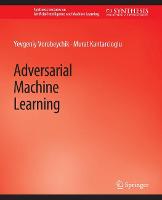


|
|
|
books
| book details |
Adversarial Machine Learning
By (author) Yevgeniy Vorobeychik, By (author) Murat Kantarcioglu

|
| on special |
normal price: R 2,741.95
Price: R 2,604.95
|
| book description |
The increasing abundance of large high-quality datasets, combined with significant technical advances over the last several decades have made machine learning into a major tool employed across a broad array of tasks including vision, language, finance, and security. However, success has been accompanied with important new challenges: many applications of machine learning are adversarial in nature. Some are adversarial because they are safety critical, such as autonomous driving. An adversary in these applications can be a malicious party aimed at causing congestion or accidents, or may even model unusual situations that expose vulnerabilities in the prediction engine. Other applications are adversarial because their task and/or the data they use are. For example, an important class of problems in security involves detection, such as malware, spam, and intrusion detection. The use of machine learning for detecting malicious entities creates an incentive among adversaries to evade detection by changing their behavior or the content of malicius objects they develop. The field of adversarial machine learning has emerged to study vulnerabilities of machine learning approaches in adversarial settings and to develop techniques to make learning robust to adversarial manipulation. This book provides a technical overview of this field. After reviewing machine learning concepts and approaches, as well as common use cases of these in adversarial settings, we present a general categorization of attacks on machine learning. We then address two major categories of attacks and associated defenses: decision-time attacks, in which an adversary changes the nature of instances seen by a learned model at the time of prediction in order to cause errors, and poisoning or training time attacks, in which the actual training dataset is maliciously modified. In our final chapter devoted to technical content, we discuss recent techniques for attacks on deep learning, as well as approaches for improving robustness of deep neural networks. We conclude with a discussion of several important issues in the area of adversarial learning that in our view warrant further research. Given the increasing interest in the area of adversarial machine learning, we hope this book provides readers with the tools necessary to successfully engage in research and practice of machine learning in adversarial settings.
| product details |

Normally shipped |
Publisher | Springer International Publishing AG
Published date | 8 Aug 2018
Language | English
Format | Paperback / softback
Pages | 152
Dimensions | 235 x 191 x 0mm (L x W x H)
Weight | 0g
ISBN | 978-3-0310-0452-0
Readership Age |
BISAC | computers / artificial intelligence
| other options |
|
|
|
To view the items in your trolley please sign in.
| sign in |
|
|
|
| specials |
|
Our moment has seen the resurgence of an anarchist sensibility, from the uprisings in Seattle in 1999 to the Occupy movement of 2011.
|

|
André Alexis
Paperback / softback
176 pages
was: R 280.95
now: R 252.95
|
A pack of dogs are granted the power of human thought - but what will it do to them? A surprising and insightful look at the beauty and perils of consciousness.
|

|
Carl Morrow
Paperback / softback
160 pages
was: R 320.95
now: R 288.95
|
In this uniquely Southern African book, Carl Morrow and Keith Kirsten guide readers step by step into the magical realms of bonsai as a hobby, horticultural practice and art form.
|
|
|
|